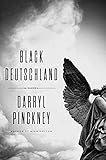 The best new novel I read in English this year was Darryl Pinckney’s Black Deutschland. The best one in Spanish was Yakarta, by Rodrigo Márquez. Pinckney and Márquez sit on true opposite sides of the literary spectrum. The first one is an established writer and an intellectual full of elegant ideas whose work I have admired for many years. Márquez is a young muscular storyteller that learned his nervous style from the rough field of sports writing. Nevertheless, when standing up against the art of producing new theories about the world with the old tools of literary writing, they both ended up publishing books that stayed with me long after I finished them — Pinckney playing the delicate game of the untrustworthy autobiographer and Márquez reconstructing the classic metaphor of the plague. Both novels are strongly political, but in a non-ideological way: they produce more questions than answers. Both of the authors are fearless at the moment of making language say things that could not be said if used conventionally. Both of them are bold and brave when working with time and place. This lets them display some structural features that, from time to time, just make you want to stand up and clap.
The best new novel I read in English this year was Darryl Pinckney’s Black Deutschland. The best one in Spanish was Yakarta, by Rodrigo Márquez. Pinckney and Márquez sit on true opposite sides of the literary spectrum. The first one is an established writer and an intellectual full of elegant ideas whose work I have admired for many years. Márquez is a young muscular storyteller that learned his nervous style from the rough field of sports writing. Nevertheless, when standing up against the art of producing new theories about the world with the old tools of literary writing, they both ended up publishing books that stayed with me long after I finished them — Pinckney playing the delicate game of the untrustworthy autobiographer and Márquez reconstructing the classic metaphor of the plague. Both novels are strongly political, but in a non-ideological way: they produce more questions than answers. Both of the authors are fearless at the moment of making language say things that could not be said if used conventionally. Both of them are bold and brave when working with time and place. This lets them display some structural features that, from time to time, just make you want to stand up and clap.
More from A Year in Reading 2016
Don’t miss: A Year in Reading 2015, 2014, 2013, 2012, 2011, 2010, 2009, 2008, 2007, 2006, 2005









